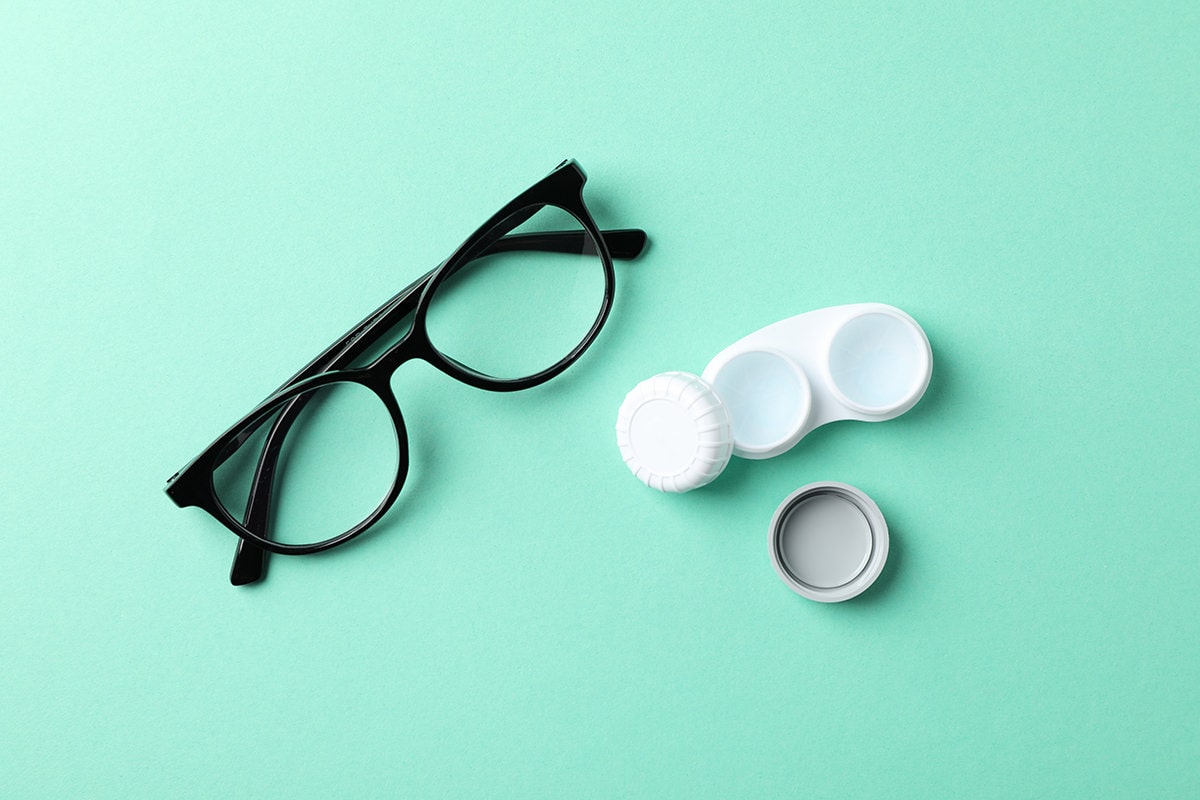The benefits and drawbacks of glasses and contact lenses are possibly familiar to those with refractive issues and vision problems. Wearing corrective lenses all day is a hassle for some, a necessary evil for others, and something most people get used to.
If you want to fix your vision with eyeglasses or contact lenses is primarily a matter of personal choice. Your decision should consider your lifestyle, convenience, flexibility, expenditure, and attractiveness. Before choosing between contacts and glasses, bear in mind that one is not inherently better than the other in terms of vision, eye health and ease of use.
Compared to contact lenses, eyeglasses have many advantages. They need minimal cleaning and maintenance, you don’t have to touch your eyes to wear them (reducing the chance of infection), and glasses are less costly in the long run than contact lenses because they don’t need to be replaced as often. Eyeglasses can also do something that contact lenses can’t: they can change the amount of light that reaches your eye for the best vision and comfort. Photochromic lenses, in particular, tend to be brighter while indoors at night, and darken while in sunlight, allowing for clear, comfortable vision in any light.
Glasses can also be a perfect fashion item and an expression of your persona!
However, contact lenses have a number of benefits over glasses. Contact lenses sit directly on your eye, allowing you to see clearly, particularly in your peripheral vision. You won’t have to worry about your glasses falling off, getting in the way or cracking while participating in sports or outdoor activities. Colour contact lenses can also alter the color of your eyes. So, which is better for your needs and way of life: glasses or contacts? To assist you in making your decision, here is a list of the advantages & disadvantages of each form of eyewear –
Pros and Cons of Contact Lenses
Advantages
Contact lenses conform to the eye’s curvature, allowing you a broader field of vision and less vision distortions and obstructions than eyeglasses.
When it comes to sports and exercise, contact lenses don’t get in the way.
Contact lenses will not interfere with your dress.
Weather doesn’t normally affect contacts, and they don’t fog up in the cold like glasses do.
Color contact lenses can be used to see how you would actually look with a different eye color. You can also get special-effect contacts to go with your outfit!
Disadvantages
Some people have difficulties placing their contact lenses in their eyes. However, this can mostly be rectified using the correct technique.
Contact lenses highly reduce the quantity of oxygen that reaches your eyes, which may exacerbate or intensify the dry eye syndrome.
Digital vision syndrome would almost certainly be exacerbated if contact lenses were worn when working at a computer.
To prevent potentially dangerous eye infections, contact lenses require regular lens treatment and lens case cleaning. Consider regular disposables if you can’t stick to the proper care and replacement period for your contacts.
When you wake up after falling asleep and wearing regular wear contacts, your eyes will feel dry, dusty, red, and irritated.
Pros and Cons of Eyeglasses
Advantages
Wearing glasses decreases the need to touch the eyes, reducing the risk of irritation & infection in your eyes
If you have dry or irritated eyes, glasses can not make the condition worse, as contact lenses can.
In the long run, eyeglasses are less expensive than contact lenses. You won’t have to replace your glasses as often (unless they break! ), and if your prescription changes with time, you may be able to retain your new frames and only replace the lenses.
Frames are stylish and can say a lot about your personality and style — the way you wear your glasses can make a huge statement.
Wind, dirt, and debris are some of the things that glasses can protect you from.
Disadvantages
Peripheral vision may be blurred because eyeglasses sit about half an inch from your eyes. When people first start wearing glasses or switching prescriptions, they often experience trouble concentrating on objects and blurry vision.
Some people dislike how glasses make them look, believing that they obscure their features or distract from their facial aesthetics.
If you have a high power, your lenses’ edges may be rough and off putting , or your frames may magnify or minify your eyes unnaturally.
The elements can impair your vision, obstructing or blurring your vision when moisture gathers on your lenses or when they fog up due to the weather.
There are a few frames that can cause headaches and general discomfort by applying steady amounts of pressure on the bridge of your nose and the back of your ears.
On one hand, most people these days can wear contacts effectively, even though they prefer to go for prescription glasses as their regular way of vision correction, thanks to advancements in contact lens technology. Therefore, choosing whether to wear contacts or glasses — and when to wear them — is typically a personal option.
LASIK procedure, on the other hand, is more available than ever before, with top-notch doctors and eye surgeons in your field to assist you. LASIK procedure is a fascinating and appealing choice. This procedure, which most patients only need once, will save you large amounts of money over the course of a lifetime. Those worried about the cost of LASIK would be relieved to learn that reputable eye doctors provide affordable prices and frequently provide financing solutions to help spread the cost over a longer period of time.
LASIK procedure can be conducted safely and quickly with minimal discomfort when performed by a qualified surgeon. After a brief period of rest, your eyes will work as though you’ve never had refractive issues, and you’ll be free to live your life as you wish – no more care, no more wondering where you put your glasses, and no more regular lens cleaning!
Check out our insightful blog posts and schedule an initial consultation to learn more about how we can help you get a perfect vision.







